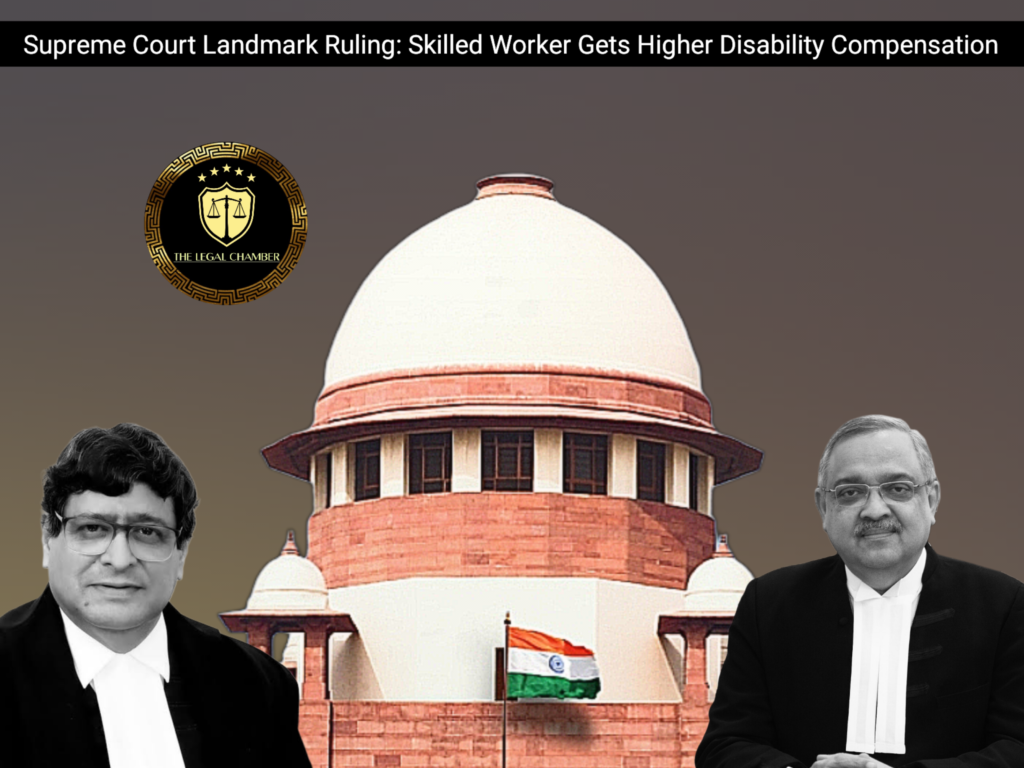
The Supreme Court upheld the claimant’s appeal, enhancing compensation for permanent disability from 25% to 35% based on medical evidence, rejecting the Tribunal’s unsupported reduction. It affirmed Rs. 6,000/month income for the skilled mason, applying future prospects and multiplier method. The Court emphasized expert medical opinion’s primacy in disability assessment and awarded Rs. 7.19 lakh with interest, reinforcing just compensation principles under motor accident claims.
Facts Of The Case:
The appellant, Suresh Jatav, a skilled mason, suffered severe injuries in a motor vehicle accident on 12.08.2002 when a rashly driven bus collided with his auto-rickshaw. He sustained a compound fracture in his right fibula, requiring surgical intervention and hospitalization for six days, as well as a fractured ulna in his right hand, which was plastered. Due to delayed healing, he required prolonged medical treatment. Before the Motor Accidents Claims Tribunal, he claimed 100% functional disability, supported by medical records and testimony from the treating doctor, who confirmed his inability to sit, walk, or lift heavy weights, leaving him in constant pain. The Tribunal, however, reduced his claimed income from Rs. 6,000 to Rs. 3,000 per month and assessed his disability at 25% instead of the certified 35%, awarding only Rs. 1.62 lakh in compensation. On appeal, the High Court marginally increased his income to Rs. 3,500 and enhanced certain heads of compensation. The Supreme Court, in its ruling, accepted his original income claim, upheld 35% disability based on medical evidence, and awarded a total compensation of Rs. 7.19 lakh, emphasizing the need for fair assessment in accident claims.
Procedural History:
The case originated before the Motor Accidents Claims Tribunal (MACT), where the appellant filed a claim seeking compensation for injuries sustained in a 2002 accident. The Tribunal partially allowed the claim, assessing his disability at 25% (reduced from the medically certified 35%) and fixing his income at Rs. 3,000/month, awarding Rs. 1.62 lakh in total compensation. Dissatisfied, the appellant appealed to the High Court, which marginally increased his income to Rs. 3,500/month and enhanced certain compensation heads, including future treatment and pain and suffering, while retaining the 25% disability assessment. The appellant then approached the Supreme Court via a Special Leave Petition (SLP), which granted leave and heard the matter. The Supreme Court critically examined the Tribunal’s and High Court’s reasoning, particularly the unsupported reduction of disability and income. It restored the medically certified 35% disability, accepted the appellant’s claimed income of Rs. 6,000/month, and recalculated compensation using the multiplier method, ultimately awarding Rs. 7.19 lakh. The Court directed the insurance company to deposit the balance amount within two months, with interest from the claim petition’s filing date, culminating in the appeal’s allowance.
READ ALSO :Death of a Partner Doesn’t End Business: Supreme Court Rules in Favor of Reconstituted Firm
Court Observation:
The Supreme Court made several critical observations while adjudicating the case. It emphasized that the Tribunal erred in reducing the appellant’s disability from 35% to 25% without valid reasoning, stressing that medical evidence, including the doctor’s testimony on the appellant’s inability to work as a mason, should prevail over conjectures. The Court noted that the appellant’s income as a skilled mason should be assessed realistically, citing Ramachandrappa v. Manager, Royal Sundaram Alliance Insurance Co. to justify adopting Rs. 6,000/month as income, factoring in annual increments for skilled labor. It underscored that future prospects must be included in compensation calculations, applying a 40% enhancement. The Court also highlighted the severity of the appellant’s injuries—compound fractures, surgical intervention, and chronic pain—to justify higher compensation for medical expenses (Rs. 20,000) and pain and suffering (Rs. 50,000). Criticizing the Tribunal’s restrictive approach, the Court reaffirmed the principle of “just compensation,” ensuring the award accounted for loss of earning capacity, prolonged treatment, and the appellant’s vocational handicap. The judgment reiterated the judiciary’s duty to prioritize expert medical opinion and socioeconomic realities in motor accident claims.
Final Decision & Judgement:
The Supreme Court allowed the appeal and enhanced the compensation awarded to the appellant, Suresh Jatav, to a total of Rs. 7,19,480/-. The Court accepted the appellant’s claimed monthly income of Rs. 6,000/- as a skilled mason and upheld the medically certified 35% disability, rejecting the Tribunal’s unsupported reduction to 25%. Applying a 40% future prospects increase and using the multiplier method, the Court awarded Rs. 5,64,480/- for permanent disability alone. Additional amounts were granted for future treatment (Rs. 25,000/-), special diet (Rs. 12,000/-), loss of income (Rs. 36,000/-), medical expenses (Rs. 20,000/-), pain and suffering (Rs. 50,000/-), and attendant charges (Rs. 12,000/-). The insurance company was directed to deposit the balance amount within two months, with interest accruing from the date of the original claim petition. The judgment reinforced the principle of “just compensation” by considering the appellant’s long-term disability, loss of livelihood, and the severity of injuries, while emphasizing the primacy of medical evidence in disability assessment. All pending applications were disposed of accordingly.
Case Details:
Case Title: Suresh Jatav vs. Sukhendra Singh & Ors. Citation: 2025 INSC 821 Civil Appeal No.: (Arising from Special Leave Petition (C) No. 20068 of 2022) Date of Judgment: July 14, 2025 Judges/Justice Name: Justice Sudhanshu Dhulia & Justice K. Vinod Chandran
Download The Judgement Here